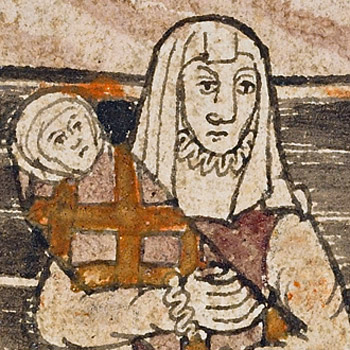Amis and Amiloun
General Information
Plot Summary

Amis and Amiloun are the sons of neighbouring barons in Lombardy, born on the same day and identical in appearance. Admired for their beauty, courtesy and prowess, they are given high positions in the Duke’s court and swear an oath of brotherly loyalty. After two years, Amiloun’s parents die. Before he returns home he has a pair of gold cups made and presents one to Amis.
Left alone, Amis rejects the friendship of the Duke’s steward, who begins to plot his revenge. When the Duke’s daughter, Belisaunt, pressures the knight into becoming her lover, the steward spies on them and tells his lord. Amis denies the accusations and offers to prove his innocence in combat. However, he is secretly aware that his opponent is in the right, and fears that swearing false oaths will lead to damnation. He sets off to ask Amiloun for help and meets his friend, who has dreamed that he is in danger, in a forest. Amiloun, who can honestly swear that he is not guilty, agrees to undertake the trial for Amis. He proceeds to the court while Amis assumes his friend’s place in his household, avoiding sex with his wife by placing a sword in the bed.
As Amiloun prepares to face the steward a heavenly voice warns him that if he continues he will become a leper. Remembering his oath, however, he fights and defeats his opponent. Convinced that he is Amis, the Duke offers him Belisaunt in marriage. The two knights exchange clothes again and each returns home. Amis marries Belisaunt and has two children, inheriting the Duke’s estate when he dies.
Amiloun, meanwhile, confesses to his wife, who is disgusted by his dishonesty. When he becomes leprous, she drives him out of his court, leaving him with only his golden cup and his young nephew, Amoraunt. They beg for food in a nearby town, until famine forces them further afield, Amoraunt carrying Amiloun in a cart. Eventually they reach Amis’ palace, where a knight admires Amoraunt’s beauty and offers him a place in the court. Amoraunt refuses and the knight informs Amis, who praises the youth’s loyalty and sends him his golden cup full of wine. When Amiloun produces his identical cup, Amis assumes that the leper has killed his ‘brother’ and beats him until Amoraunt reveals his identity. Delighted and remorseful, Amis welcomes Amiloun into his court.
After a year, both friends are visited by an angel who tells them that Amis can cure his friend by anointing him with his children’s blood. Although he loves his family and fears committing a deadly sin, Amis remembers his oath of loyalty. On Christmas Eve, he cuts the infants’ throats, anoints the reluctant Amiloun and goes to his chapel to pray. When Belisaunt returns from church, Amis tells her what he has done and she agrees to support him. They are both delighted to find Amiloun returned to health, but their happiness is complete when they find their children alive and well.
The friends imprison Amiloun’s disloyal wife and give her lands to Amoraunt before returning to Amis’ palace. They found an abbey and when they die on the same day, they are buried in the same grave.
From: Jennifer Fellows, Of Love and Chivalry: An Anthology of Middle English Romance. London: J.M. Dent for Everyman, 1993.
Manuscript: Edinburgh, National Library of Scotland, MS Advocates 19.2.1, with beginning and end from London, British Library, MS Egerton 2862.
Manuscripts
Click a title below to search for all romances in that manuscript.